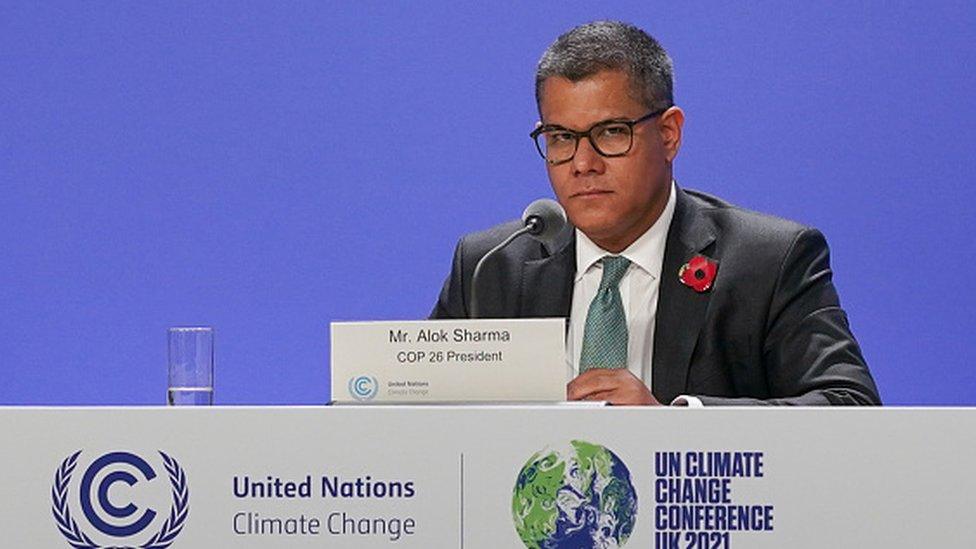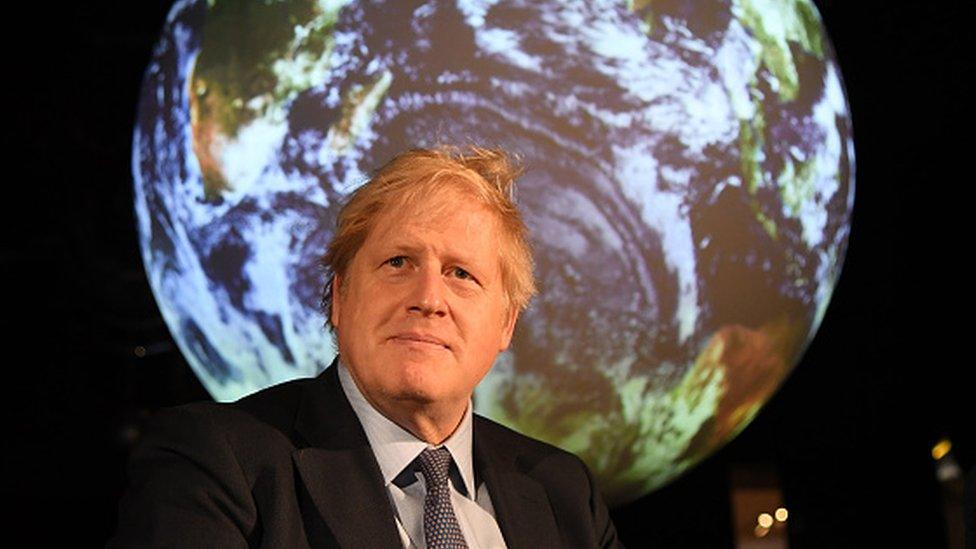Net zero: Tories running away from climate pledge, Labour says
- Published
- comments
Watch: Boris Johnson says the UK was "right" to go for net zero
Tory leadership rivals are "running away" from the UK's pledge to curb carbon emissions to net zero by 2050, Labour's Ed Miliband has said.
The shadow minister for climate change said the Tory candidates appeared to be rowing back on the legal commitment.
Chairing cabinet for the last time, Prime Minister Boris Johnson said achieving net zero was the "right thing to do".
The target has been a major debating point in the race to succeed the PM.
In 2019, MPs passed a law that committed the UK to a legally binding target of net zero carbon emissions by 2050.
Countries globally have agreed to meet this target, which scientists say is necessary to slow global warming and reduce the risk of severe consequences from climate change.
The target has come into sharp focus during this week's heatwave, which has sent temperatures soaring to record levels in the UK on Tuesday.
The remaining four candidates in the Tory leadership race - Rishi Sunak, Penny Mordaunt, Liz Truss, and Kemi Badenoch - have committed to meeting net zero by 2050 but raised concerns about the economic impact at a time of rising living costs.
Mr Miliband said they had done so through "gritted teeth" while proposing tax and energy policies that showed they were not "serious about the situation".
Mr Miliband drew attention to "worrying" comments by the candidates including Ms Badenoch, who had previously likened the net zero target to "unilateral economic disarmament".
The Labour shadow minister said Mr Sunak had been a "foot-dragger" on net zero, Ms Mordaunt had promised to scrap green levies, while Ms Truss wanted to restart mining for shale gas, known as fracking.
"That doesn't strike me as a group of people who are deeply committed on the climate crisis," Mr Miliband told the BBC.
Defending the Tory leadership hopefuls, Transport Secretary Grant Shapps dismissed a suggestion that the party would abandon net zero under new management.
"In fairness to the other candidates, everybody is saying we need to meet that 2050 target," Mr Shapps said. "Of course there's some legitimate debate about how your get there, quite rightly as well, particularly in a cost of living squeeze.
"But I think it's undeniable - and a day like today rather proves the point, doesn't it - that if you don't tackle these things then the economic and social cost is going to be even greater still. So we have to do it."
Consensus tested
Mr Shapps's sentiments were echoed by the prime minister during the final scheduled cabinet meeting of his premiership on Tuesday.
As much of the UK sweltered in the heatwave, Mr Johnson told ministers: "Who can doubt that we were right to be the first major economy to go for net zero?
"It may be sometimes unfashionable to say this but it is the right thing to do."
The legal commitment to net zero was first made by former Prime Minister Theresa May's government and taken forward by Mr Johnson since his election in 2019.
At the COP26 climate conference in Scotland last year, Mr Johnson attempted to rally the international community behind efforts to curb carbon emissions.
But since then skyrocketing inflation and the contest to elect Mr Johnson's replacement have tested the consensus on reaching net zero within the party.
In a pointed intervention, cabinet minister and COP26 President Alok Sharma told the Observer newspaper he might resign if the next prime minister failed to commit to net zero.

Alok Sharma led the UK's efforts to secure commitments to net zero at the COP26 conference last year
Mr Sharma then chaired a packed-out hustings, where all the candidates confirmed their commitment to the climate target.
The Conservative Environment Network (CEN), which organised the hustings, said it was now clear the "candidates largely understand the strength of public and parliamentary support for environmental action and the strong economic and security case for achieving net zero".
"Despite the hopes of a few siren voices, the Conservative leadership race is focused on how - not if - to decarbonise the UK's economy and restore nature," Sam Hall, the director of the CEN, told the BBC.
Chris Skidmore, former energy minister and chairman of the Net Zero Support Group of Conservative MPs, said he was "delighted" all candidates had now signed up to the pledge.
He said: "Since the beginning of the Conservative leadership contest, there has been a question mark over the future of net zero and our climate commitments, especially with a few candidates speaking against the idea of a target to deliver emissions reductions.
"The reality is that this is an internationally agreed framework that the UK has led, demonstrating that you can halve your carbon dioxide emissions at the same time as doubling the size of the economy.
"As the energy and climate minister who signed net zero into law three years ago, I know how seriously other countries are watching the UK's progress to decarbonise. We are seen as international leaders."
Meanwhile questions remain over how the UK intends to reach net zero by 2050.
On Monday, a court ordered the government to explain exactly how its policies will achieve the target, after a legal challenge from environmental groups.
One of the groups, Friends of the Earth (FotE), described the decision as a "landmark ruling" and "a huge victory for climate justice and government transparency".
£1.4tnthe estimated cost to the whole economy
£344bnthe estimated net cost to the state with savings considered
0.4% of GDPthe estimated average cost to the state a year over three decades
The costsof net zero could be significant but not exceptional
Failureto control climate change would incur much larger costs
Benefitsof quick green transition could be significant
Related topics
- Published3 March 2022

- Published25 October 2021

